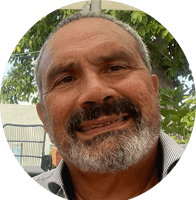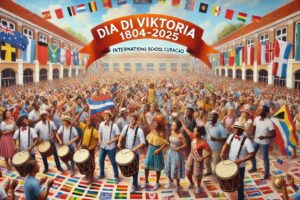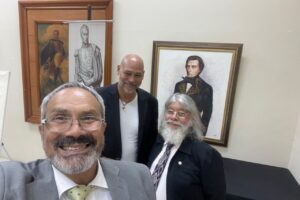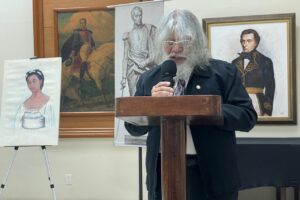
Curaçao, as an autonomous country within the Kingdom of the Netherlands, operates under a unique political structure that grants it significant self-governance on domestic issues while leaving foreign affairs primarily under the control of the Kingdom’s government in The Hague. This structure raises critical questions about whether Curaçao’s government can or should refrain from expressing opinions on global events, especially when injustices occur. The issue also touches on the principles of “freedom of speech,” “moral responsibility,” and “political autonomy” within a constitutional monarchy.
This analysis will examine Curaçao’s legal position, the constraints and possibilities it faces regarding international matters, and whether it can “hide” behind the Dutch government on issues of global importance. We will also consider “freedom of speech” and the ability to “agree to disagree” in international relations.
1. Curaçao’s Constitutional Position within the Kingdom of the Netherlands
Autonomous Domestic Governance
Since October 10, 2010, when Curaçao gained autonomous status within the Kingdom of the Netherlands, it has had control over its internal affairs, including healthcare, education, and economic policies. However, foreign policy, defense, and citizenship matters remain under the purview of the **Kingdom Government**, which includes representatives from the four constituent countries: the Netherlands, Curaçao, Aruba, and Sint Maarten.
Foreign Affairs and the Kingdom’s Role
The Kingdom of the Netherlands handles foreign policy as a unified entity, representing the interests of all four constituent countries in international diplomacy. This is governed by the Kingdom Charter, which gives the Dutch government the authority to manage foreign relations, including treaties, international disputes, and other global issues.
However, Article 43 of the Charter grants Curaçao a role in influencing foreign affairs that pertain to its specific interests. This means that while Curaçao does not have full autonomy to make independent foreign policy decisions, it does have **input** in matters that directly affect its national interests, particularly its economic and political stability.
2. Curaçao’s Ability to Have an Opinion on Global Issues
The Argument for Remaining Silent
Curaçao’s government may claim that its hands are tied on foreign policy issues, relying on the argument that it cannot take an official stance on international conflicts, global injustices, or foreign policies because this is within the domain of the Kingdom Government. This could be framed as a **constitutional obligation** to defer to the Kingdom’s unified stance on global matters.

The Counter-Argument: Freedom of Expression and Moral Responsibility
While Curaçao’s government may not be able to set foreign policy officially, this does not necessarily mean it must remain silent on matters of global importance, particularly regarding moral and ethical issues. As a democratic entity, Curaçao must uphold freedom of speech and the right to dissent, even within the framework of the Kingdom of the Netherlands.
– Freedom of Expression: Under the Dutch and Curaçaoan constitutions, freedom of expression is a fundamental right. Government officials, civil society, and even the press in Curaçao are free to express opinions, including those that may critique or differ from official Dutch policy. No legal obligation exists to remain silent on injustice or human rights violations worldwide.
– Freedom to Disagree: The autonomy of Curaçao, while limited in foreign affairs, does not prohibit it from expressing **disagreement** with policies or actions taken by other countries or even the Dutch government itself, provided that this disagreement is framed within the context of free speech and political discourse. Dutch political culture has long celebrated a tradition of debate and dissent, making it incongruous for Curaçao to argue that it cannot express any opinion.
Moral and Ethical Considerations
When significant global events occur—such as war crimes, human rights abuses, or other forms of injustice—there is an ethical imperative for governments, even if they are not directly involved in foreign policy, to at least acknowledge these events. Silence in the face of clear injustice can be seen as tacit approval or indifference, which could damage Curaçao’s moral standing domestically and internationally.
– Historical Precedent: Many countries with similar limitations in foreign policy have found ways to express moral positions on global events without officially violating their constitutional boundaries. For instance, subnational governments like **Catalonia** in Spain, **Quebec** in Canada, or even U.S. states have made their voices heard on international matters, such as human rights, climate change, and global conflicts.
– Public Accountability: The Curaçaoan government also has a duty to its citizens, who may feel strongly about specific international issues, such as conflicts involving countries with which Curaçao has cultural or economic ties (e.g., Venezuela, Palestine, or Israel). In such cases, the government’s refusal to speak on these issues could be viewed as ignoring the democratic will of the people.
3. Can Curaçao Hide Behind the Dutch Government?
Legal Perspective
Curaçao can defer to the Dutch government on foreign policy matters, as the Kingdom’s government is constitutionally responsible for international relations. However, this does not preclude Curaçao from expressing non-binding opinions on international issues. The Kingdom Charter does not prevent autonomous countries within the Kingdom from having a voice in global matters, especially those related to human rights, injustice, or moral concerns.
– Constitutional Boundaries: The Dutch Constitution protects the right to freedom of expression, which applies to all constituent countries, including Curaçao. Therefore, no legal framework would compel Curaçao to remain silent on all foreign affairs issues.
Moral and Political Risks
If Curaçao chooses to remain silent on critical global injustices, it may face criticism from its citizens, who may view this as a failure of leadership or moral responsibility. Moreover, international audiences may question Curaçao’s commitment to universal values like human rights and justice in an increasingly interconnected world.
– Political Autonomy and Responsibility: Curaçao has the political autonomy to speak out on issues of international concern, even if it cannot directly influence foreign policy. Failing to do so may lead to domestic and international reputational damage. Remaining silent may also weaken Curaçao’s voice within the Kingdom on issues where it does have direct interests, such as regional security or climate change.
4. Freedom of Speech and the Right to Disagree
Democratic Values in the Kingdom of the Netherlands
Freedom of speech is a core principle in the Kingdom of the Netherlands, which extends to Curaçao. While the Kingdom’s government manages foreign policy, individual politicians, civil society groups, and citizens in Curaçao retain the right to voice their opinions, including on international issues. The right to disagree is essential in any democracy, and this principle applies equally to autonomous regions like Curaçao.
– Political Debate and Disagreement: Even within the context of foreign policy, disagreements between different countries or political entities within a larger kingdom are common. Curaçao can express concerns, question policies, or raise awareness about global events, even if the Kingdom’s official stance differs. As long as these expressions are made within democratic dialogue and respect for the constitutional order, there is no legal impediment to voicing concerns about international injustices.
Curaçao’s Influence within the Kingdom
Curaçao can leverage its input within the Kingdom on foreign affairs that directly impact its interests. This influence, though limited, gives Curaçao an avenue to express concerns or disagreements within the Kingdom’s Council of Ministers, where representatives from all four constituent countries participate in decision-making processes.
5. Curaçao’s Responsibility and Rights
Curaçao’s government cannot legally set foreign policy, but it does not have to remain silent in the face of global injustice. While the Dutch government handles foreign affairs on behalf of the Kingdom, Curaçao retains the right to express its opinions on international issues, particularly when they involve moral or ethical concerns.
In a democracy, freedom of speech, including the freedom to disagree with official policies or stances, is paramount. The idea that Curaçao cannot have an opinion because of foreign policy limitations is not grounded in the Kingdom’s constitutional structure or the principles of democracy.
Curaçao has the political and moral space to speak out against injustice, and doing so would align with its values as a democratic entity. In such cases, silence could be interpreted as complicity or indifference, which carries risks for Curaçao’s domestic legitimacy and international reputation. The government must balance its legal obligations with its moral responsibilities, ensuring that it upholds the values of justice and human rights, even within the constraints of its constitutional position.

Tico Vos is a professional photographer, producer, and tourism specialist. He has been documenting the History, Culture, and News of Curaçao. This site is a documentation of the history of Manuel Carlos Piar.





